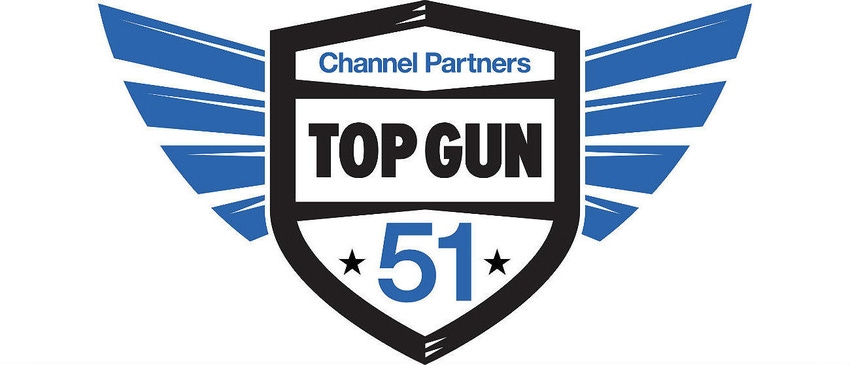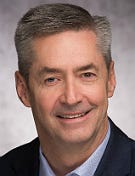Selling on relationships and friendships is no longer enough.

Nice InContact U.S. channel leader Ray Hicken is focused on pursuing new partnerships and creating new revenue streams for the cloud contact center company.

Nice InContact’s Ray Hicken
Hicken rejoined Nice InContact last year to oversee U.S. channels. Before that, he headed up channel sales at CarrierSales and contact center sales at Telarus. He leads a team to develop and execute growth strategies for all U.S.-based strategic partners.
His work at CarrierSales was instrumental in drawing Telarus’ interest in acquiring that company in late 2017.
Omdia recently ranked Nice InContact No. 1 overall in technology assessment, execution assessment and market impact ratings for multichannel cloud contact center.
Hicken is is part of our Top Gun 51 for 2020. Introduced last year, the Top Gun 51 recognizes premier leaders in the indirect IT and telecom channel. There were three criteria considered in selecting this year’s group: advocacy for the channel; commitment to partners’ business success; and dedication to earning the channel’s trust. To come up with the list, we solicited input from those who know channel executives best. We’re talking about distributors, master agents and industry analysts.
Nice InContact’s Ray Hicken is part of Channel Partners/Channel Futures’ 2020 Top Gun 51. This program recognizes today’s channel executives who build and execute channel programs that drive partner, customer and supplier success. See the full list. |
In a Q&A with Channel Partners, Hicken talks about his experience building channel programs from the ground up, and what Nice InContact partners can expect from the company moving forward.
Channel Partners: How did you first become involved in the channel? Was it part of your overall career plan?
Ray Hicken: I got involved in the channel when I was first at Nice InContact. I was promoted from a sales rep to a channel manager and eventually was director of channels. It wasn’t part of my overall career plan. But it is a natural fit because of my background in sales and sales management. And it lined up well with career plans and career objectives at that time.
CP: Have you been responsible for building channel programs from the ground up? If so, how did your experience come into play in these processes?
RH: I built a channel around contact center when I went over to CarrierSales, which was a master agency in the Mountain West … that was acquired by Telarus about two years ago. I brought on different suppliers who had never sold in the contact center space, and helped them to know how to work within the channel-direct channels. And I also was able to help them come up with different kinds of programs for agencies and for the different subagents that could sell our products. We were able to create also new partnerships with contact center-focused subagents and partners who became very strategic to drive a contact center practice.
My experience helped immensely because I knew contact center products very well and sold it myself, so I could speak intelligently to that. And then I had some experience with channel and sales management for the last 25 years in the realm of higher education where I was a manager over large sales groups. So I had some experience in building things like a sales group and a sales strategy … that naturally fit into that program.
CP: What have you learned most from your experience with the channel and partners?
RH: They’re passionate and they care a lot about their customers. The channel is heavily influential and it provides a …
… significant service to not only suppliers, but to partners and to businesses. I’ve learned most that you have to have integrity and you have to work hard. And you have to be honest and fair. And do what you say you’re going to do. If you’ll do that, you’ll be successful in any job.
CP: What are the components of a successful channel program? Are there things that used to work, but now don’t?
RH: The key component … is the people who work in your channel program. People buy from people, and success comes when people trust people they want to work with. Secondly, a strong product that you can represent to the public that has a demand and a need in the marketplace. Third, you have to have the proper incentives to drive interest in your product.
Fourth is to have a good way to share and impart knowledge. You’ve got to have a way to helps people increase their knowledge level and their confidence level enough to bring your particular product into a channel.
And you have to have a strong network of successful relationships with multiple touch points in a channel, not just one. You want referral, resellers and different types of resellers that can represent your product across different buying models. So it’s really important that you have those components to be a success.
You just can’t go in now and sell on your relationships and friendships anymore. It’s not commodity selling anymore; you have to have a knowledge base. You have to have an expertise base to your efforts. And so our effort is always to help our partners know our product better. Then they can be more successful when they go into their customers and represent our products to the different companies that they may be selling to.
CP: What do you consider your biggest accomplishments in working with the channel?
RH: Besides the relationships I have, not only professionally, but personally, that have come through the channel … we were able to build at CarrierSales a top-notch channel program. We took a pretty regionally based master agency, and with the work of a lot of incredible people … I was able to bring on several cloud contact center providers to work in the channel [and] to help them figure out how to be successful in the channel. They had not worked in this channel at all in the master agency world. They hadn’t worked at all with channel at least in the referral world, direct referral as a revenue stream for them. Those were companies like Five9, Talkdesk, Genesys, Sharpen and many others that had different parts of the contact center through their platform that they were just not working in the channel — or very little.
We helped to build it out so that CarrierSales was the No. 1 supplier in the channel as a master agency for Nice InContact for the last five years as it has continued on with Telarus. I believe that success in part led to Telarus‘ interest in merging with CarrierSales so they could go build a cloud contact center practice. And I was able to get that started at Telarus before I left and came to Nice InContact.
CP: What are your career goals going forward?
RH: To continue to work to help Nice InContact become very successful in the channel. Being over the U.S. channels and over pursuit of new partnerships, I have responsibility to …
… create new channel revenue streams. We’re working very hard on that to seek out different partnerships that bring us the type of revenue that we’re seeing in the channel, but to take really good care of the existing partnerships that we have. We’re enhancing that by adding channels in different areas like GSIs and SIs, and customer relationship management (CRM) [providers], just to name a few. And doing it in the right way with integrity and honesty, and hard work, and representing Nice InContact as a respected leader and maintaining that leadership position that we have through the channels.
CP: What sort of advice would give someone who is just starting out in channel leadership?
RH: The first advice I’d give them is represent your company well. And in order to do that, you need to know your company’s product well. Be a leader in thought and knowledge, and understanding of your product.
The second thing is, look for opportunities always to increase your company’s position through very different verticals and channels. Take care of the channels you have. But also always be looking to the new horizon, new channel verticals and new opportunities.
Also, always operate with integrity and honesty. Work really hard. Be viewed as and respected as a leader in the way you do what you say you’re going to do. We live in a world where sometimes people don’t follow through on their commitments. To be successful, you have to maintain your level of integrity by saying what you’re going to do and then do it.
And I would also say look to gather around you the best of the best. Don’t settle for mediocrity. Look for people who have great potential and are respected, and have the same set of values and ethics, and drive to achieve success. Look for people who are as good or better than you. Don’t be afraid to put people in with you who can offset and make up for your known weaknesses. And remember to have fun; enjoy the journey.
Read more about:
AgentsAbout the Author(s)
You May Also Like


